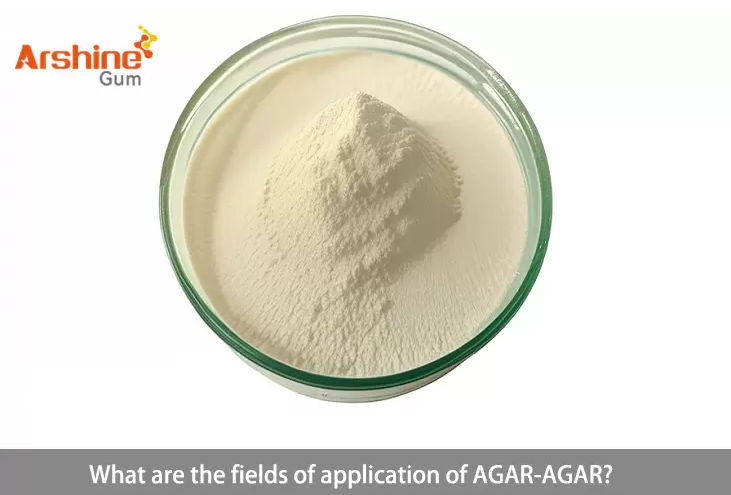Agar-agar, often simply referred to as agar, is a versatile and natural hydrocolloid derived from marine algae, specifically red seaweeds. It has a wide range of applications across various industries, including food, pharmaceuticals, microbiology, and biotechnology. Due to its unique gelling, thickening, stabilizing, and clarifying properties, agar has become an indispensable ingredient in many products and processes. Let's explore the diverse application fields of agar in more detail.
Food Industry:Agar's most well-known application is in the food industry, where it serves as a gelling agent, stabilizer, and texture enhancer. Some common uses of agar in the food industry include:
1. Gelling Agent:Agar's ability to form strong, clear gels at relatively low concentrations makes it a popular choice in making desserts like gelatin-based candies, fruit jellies, and custards. Its gels are more heat-resistant than those formed by animal-derived gelatin, allowing them to remain stable even at higher temperatures.
2. Vegan and Vegetarian Products:Agar's plant-based origin and gel-forming properties make it a favored alternative to gelatin in vegan and vegetarian products, such as gummy candies, marshmallows, and gelatin-free desserts.
3. Bakery and Confectionery:Agar can be used in baking as a thickening agent for fillings, glazes, and frostings. Its ability to set at room temperature and its compatibility with acidic ingredients make it versatile for various bakery applications.
4. Dairy and Dairy Alternatives:Agar is employed in the production of dairy-based and plant-based yogurts to improve texture and stability. It can also enhance the mouthfeel of dairy-free alternatives like almond or coconut milk-based products.
5. Meat and Seafood Products:Agar can be used to create mock meat products with desirable textures and structures. In seafood analogs, agar mimics the texture of real seafood products.
6. Nutrient and Microbial Media:Agar is a critical component of nutrient agar, a solid medium used for culturing microorganisms in laboratories. Its ability to solidify at room temperature while remaining inert to microbes makes it ideal for microbiological research.
7. Clarifying and Stabilizing Agent:Agar's ability to form strong gels also makes it suitable for clarifying liquids such as juices, broths, and stocks. It can capture solids and impurities, leading to clearer liquids.
Pharmaceuticals and Biotechnology:In the pharmaceutical and biotechnology sectors, agar's versatility is evident in several applications:
1. Microbial Culture:Agar is an essential ingredient in various culture media used for the growth of bacteria, fungi, and other microorganisms. Petri dishes filled with agar-based media provide a solid substrate for microbial growth and study.
2. Drug Delivery Systems:Agar hydrogels have been explored for controlled drug delivery systems due to their biocompatibility and ability to encapsulate active compounds. These hydrogels can release drugs over extended periods.
3. Tissue Engineering:Agar-based hydrogels are used as scaffolds for tissue engineering, providing a supportive matrix for the growth and development of cells.
4. Gel Electrophoresis:Agarose, a purified form of agar, is widely used in gel electrophoresis for separating DNA, RNA, and proteins based on their molecular weight.
5. Diagnostic Tests:Agar-based media are used in diagnostic tests such as blood culture plates and bacterial susceptibility testing.
Cosmetics:In the cosmetic industry, agar finds applications in formulations requiring gelling, thickening, and stabilizing agents:
1. Hair and Skincare:Agar can be used in hair gels, styling products, and creams as a natural gelling and thickening agent. It contributes to the desired texture and viscosity of these products.
2. Makeup:Agar-based gels can serve as foundations, eye gels, and other makeup products.
3. Bath and Body Products:Agar can be used in bath jellies, shower gels, and bath bombs to provide unique textures and tactile experiences.
4. Fragrance Delivery:Agar's ability to form stable gels can be used to encapsulate and deliver fragrances in various cosmetic products.
Other Industries:Beyond the major application areas mentioned above, agar's properties find utility in other sectors as well:
1. Agar Art:Artists and educators use agar as a medium for creating microbial artwork. By growing pigmented bacteria on agar plates, intricate and colorful patterns can be produced.
2. Textile Industry:Agar can be used to modify the texture and handfeel of fabrics.
In conclusion, agar's broad range of applications stems from its remarkable properties as a gelling, thickening, stabilizing, and clarifying agent. Its contributions span across the food, pharmaceutical, biotechnology, cosmetics, and even artistic industries. As a natural and versatile ingredient, agar continues to play a vital role in shaping the characteristics and quality of numerous products and processes in our daily lives.
https://www.arshinegum.com/Company-news/what-are-the-fields-of-application-of-agar-agar
